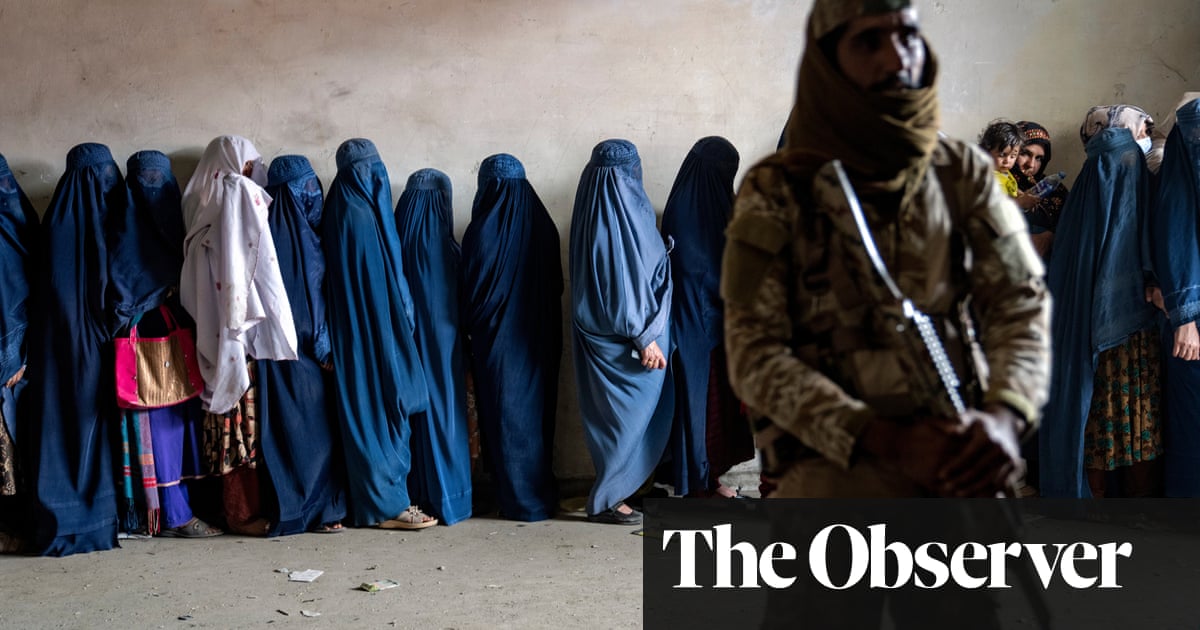In the immediate aftermath of Kabul’s shocking and rapid fall to the Taliban in August 2021, women across the Afghan capital began a painful process of textual self-erasure in anticipation of the house-to-house searches that would inevitably follow. Precious books that had helped them become themselves were set alight, proof of qualifications earned through years of hard study was destroyed in an instant, journal pages were rinsed of ink, bowls of lapis-hued water all that remained of the bold hopes and dreams confided within them.
For the 21 members of a women’s creative writing group, a single lifeline to the outside world would be preserved: the WhatsApp group chat set up by Untold Narratives, a UK-based development programme for marginalised writers that had been helping them compile an anthology of their stories.
In the months that followed, their words – downloaded several times a week by an Untold staffer in London so that they could be deleted from their own devices for safety – accreted to form a collective diary. By the time the anniversary of the Taliban takeover came around, they had between them written 200,000 words. Of these, 70,000 have now been meticulously extracted and translated from Dari and Pashto into English. The result is My Dear Kabul: A Year in the Life of An Afghan Women’s Writing Group, an intimate chronicle of history as it unfolds, beginning amid the chaos of the day the Taliban entered the city and closing the following summer.
As gunshots and explosions subside, fear continues to taint every aspect of life, exacerbated by inflation and power cuts, by bureaucratic impasses and by the humiliation the women face at the hands of emboldened men in shops and on the streets. Freedoms are snatched from them, and with schools, offices and eventually public parks forbidden, the claustrophobia is palpable. As a cultural activist named Naeema writes: “Three years ago, I was involved in publishing 10 books for children. Today, my biggest achievement is that I took a taxi alone.”
Crucially, this is a book that honours the individuality of its contributors and their voices, and in so doing amplifies their collective power. Known only by their first names, the writers range from single women in their 20s, such as Sadah, a schoolteacher, and Marie, who established a counselling service run by women, to Najla, a grandmother nearing her 60s with a degree in language and literature. They’re of different ethnic backgrounds, too, gesturing to the complexity of a country all too often perceived as homogenous by outsiders. As a consequence of its tragic and tumultuous recent history, several authors were born in exile, and some – Freshta, for instance, who reported on women’s affairs for a radio station that was threatened by the Taliban – were forced to flee abroad even before the takeover.
The women’s approach here is as distinct as their perspectives. There are entries that resemble poems and others that read like reportage. Some strive for analytical insights, others give a more impressionistic record. Images shimmer with indelible vitality: Nilofar, a literature student, dreams she’s bicycling to a picnic, an Afghan flag in her hand. Maryam, 25, who uses a wheelchair, tracks the seasons by describing the quince tree outside her Kabul bedroom. “Little feathers are falling around my head,” she notes in spring, asking: “Are these butterflies or quince blossoms leaving the tree?” Najla, meanwhile, describes how her nephew wears a different disguise each day to avoid being followed by the Taliban as he leaves for his English course, smiling behind his grandfather’s sunglasses.
Sometimes nothing more than raw feeling is forthcoming: anger and terror, despair and confusion. As aid worker Atifa writes from Herat, in the western part of the country: “It is meaningless to hope or wish, forbidden in fact.” The women’s need to appear strong for their families becomes a recurring theme but in this virtual safe house, there is room for every emotion.
Is there bravery here? Yes, in abundance. It takes the form of lipstick as well as spray-painted graffiti, of going to the office knowing there are checkpoints ahead, as well as night-time escapes across rooftops and borders, sometimes legally, sometimes with people smugglers. And of course the very act of adding to the group chat, of bearing witness and refusing to be silenced, is courageous in the context of these women’s lived realities.
By the book’s close, many are facing new challenges, contending with the anguish of exile and the varying levels of frustration and prejudice that come with living as a refugee in countries from Iran and Tajikistan to Germany and Sweden. It’s in Stockholm that Masoma, an engineer who was born a refugee, finds herself starting over once again, alone, on her 48th birthday. It’s in this same city that she makes a decision. “Today I bought myself flowers and thought to myself that I must live,” she writes.
after newsletter promotion
The resilience that she and the rest of the group demonstrate is extraordinary. But it’s also, in its way, shaming because while they don’t dwell on it, the question hovers: where were the global protests on behalf of Afghanistan’s women and girls when the Taliban entered Kabul? Where are they today, three long years later?
